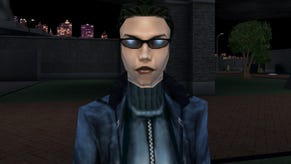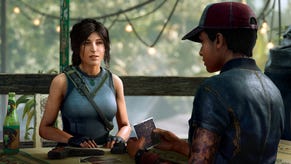Interview: Off Topic On The Nameless Mod
Earlier in the week we had a look at The Nameless Mod for Deus Ex, which was announced complete a few days ago following seven years in development. Here we chat to Chief Creative Officer Jonas Wæver of Off Topic Productions about how you create one of the largest mods ever made, why you'd set it in a virtual messageboard and how to deal with the Dunce Gamers' League.
RPS: You're Creative Officer of Off Topic Productions. What does that mean?
Jonas: It's just a fancy word for Game Designer. When we became a company we joked about giving everybody a Chief
RPS: For seven years? How on Earth do you keep an unpaid team working for seven years?
Jonas: You pretty much don't. You get people to commit to delivering certain things, such as the lit and textured geometry for a particular level, and then if they actually make good on that you see if they're willing to volunteer for another piece of work. A lot of the time people will give up and leave you with a half-finished level, and then you try to find somebody to take over or do it yourself. Certain team members (which we called the core team) would stick with us to the end, but since it was a hobby project everybody worked in phases, including me. You'll work hard for a couple of months and then it's exam time at university or crunch time at work and you have to take some time off the mod for a bit.
Happily, if you've got a couple of really dedicated team members, they tend to inspire the rest of the team to put in a bit more time as well. While over 50 people worked on The Nameless Mod, not counting the voice actors, I really should mention our producer Lawrence Laxdal who kept me from killing half the team and vice versa, Chris Potts, who constructed well over half of our levels, our programmers Shane Tapp and Nick Van Sickle who continued to work tirelessly on the patches after we released our lead artist Jason Cooke, and our main sound tech Alek Burnes, who singlehanded made almost all our audio effects.

RPS: Were you always intending for TNM to be such a sizeable project? Or did it spiral outwards as you worked?
Jonas: No, we had no plans to spend more than a year on it. In the beginning it was just meant to be a single city hub linking to some mission areas and shops and such, but the project developed very organically because everybody in our community could follow our development process and chime in with suggestions. We were pretty bad at selecting between those suggestions, so pretty much everything just went into the design docs.
I think the central problem - which also ties into the last question - is that it's very hard to get people to work on your ideas, you have to leave some room for them to add their own creativity to the project, otherwise they'll get bored and move on. Some contributors you can keep in a fairly short leash, but others have to be allowed to do whatever they feel like some of the time.
RPS: So in allowing contributors creative freedom, they became more reliable at the expense of some quality control. That's interesting.
Jonas: Exactly. The design document sort of specified the content and the features we needed in order to finish the game, but that had to be balanced with a suitable amount of feature creep to keep our contributors interested. It's just a question of getting people personally invested in the project since you can't pay them money to work on the boring stuff.
Back around 2002, the Deus Ex community was full of people with mod ideas but no idea how to realise them, and there were only so many skilled modders to go around. The fact that we could promise these modders their own character in the game definitely helped to get people interested. I'm not sure how much good it did us later though, some modders who might otherwise have wanted to help out just for the chance of being part of such a big project may have been turned off by the apparent exclusivity of it. Not to mention potential players who were skeptical about the weirdness whole concept.
RPS: Yeah. Let's touch on that. TNM's wiki describes the game's setting as "a lame idea". What makes you guys say that?
Jonas: I think there's a pretty major stigma attached to so-called "forum fan fiction", which is something you'll find in a lot of tight-knit communities. It tends to be very exclusive and often quite poorly executed, and the idea of spending such a long time on a story about a bunch of nerds on an Internet forum seems pretty stupid, doesn't it?

RPS: Stigma's one thing. But it doesn't mean there isn't massive potential in this idea. My one criticism of TNM is that you didn't go far enough with the setting. Often it does feel like forum fan fiction, but it didn't have to.
Jonas: Yeah I think you're right. The consistency of the setting is a common point of critique - it's enough that you can get into it without "having been there", so to speak, but if you take a closer look at the game, there's a lot of potential for developing the setting in a more unique direction. I think the fact that we really wanted to maintain the Deus Ex vibe limited us in that regard.
RPS: I actually think you best Deus Ex in terms of a conspiratorial setting. In Deus Ex I was waiting for the game to tell me the truth after I'd blown up another robot. In TNM, it feels like the truth is right there if you could just get into such and such a computer. Was that a conscious decision?
Jonas: Yes. One of the main things I love about Deus Ex is how it's narrative is everywhere - when you play it, even though the main points are always explained to you, there are tons of details about the background fiction lying around in newspapers, emails, public bulletins, and so on. I wanted to do as much of that as possible in TNM, and a benefit of 7 years of development is that it leaves a lot of time to develop the setting and add details like that to the world.
I love that lineage of narrative design that you can trace all the way back from Origin's games through Looking Glass to ION Storm Austin and Irrational, where the idea is that the player should always know what he or she is supposed to be doing, but everything else is optional. We're aware that TNM's narrative can be very overwhelming with its complexity, but as long as you always know what you need to do - which is what the goals menu is for - we're perfectly okay with it if you're confused about some of the motivations or allegiances of the different factions and characters in the game.
RPS: The mod's willingness to overwhelm in general was something I really liked about it. Less "Complete this one task" but "Here are your overarching goals- go".
Jonas: Yeah. We had to actually scale back on that a bit. We had some missions that basically gave you no instructions on how to achieve your objective, but they did get a bit ridiculous at times. As a game designer, it can be pretty hard to tell when you've gone overboard with that - I really wanted to trust the player, but I think if I hadn't specifically designed those missions myself, I would've just been confused and frustrated by the lack of direction.
Our voice-over manager, Gelo, who helped out a lot with the plot and some of the writing, declared himself an advocate of the Dunce Gamer's League and compelled me to add more guidance to those missions, and I do think the game is better for it. Between us, I think we've reached a pretty good compromise between guiding the players without holding their hands.

RPS: I hate the Dunce Gamer's League.
Jonas: Yeah I hate them too, but sometimes I fear that I should be a card carrying member.
RPS: Traditionally, making a mod opens eyes as to how much work is involved in making a game, but having overseen something bigger than some commercial games in your spare time I feel you're entitled to the moral high ground. What element of TNM would you love to see in commercial RPGs?
Jonas: A week ago I would've said the way the game responds to almost everything the player does - how the characters constantly comment on your actions and react to your play style, and how many choices you get all the time. But I've just finished Dragon Age, and I'm frankly astonished by how much detail like that they've managed to cram into such an enormous game.
So now I'll pick the environmental interaction instead. That's another thing we got from the Looking Glass school of game design, of course, and Deus Ex in particular, but being able to actually hack people's computers to read their email is the kind of feature I wish more games had. GTA4 had a lot of that, but it was spread pretty thin across their game world. TNM is a lot more dense. If I may say so myself.
RPS: I'm still waiting for the cop or cowboy game which gives you a very small town for the entire game, and you get to know every resident of this small, highly interactive world.
Jonas: It's what I wish BioShock had been. Don't get me wrong, I enjoyed BioShock, but its setting begs to be a microcosm full of incidental details.
RPS: It begs to be a System Shock game rather than an FPS, yes.
Jonas: I didn't want to say it! I guess Irrational wanted to actually sell some games.
RPS: And who can blame them. Thanks for your time, Jonas.

















